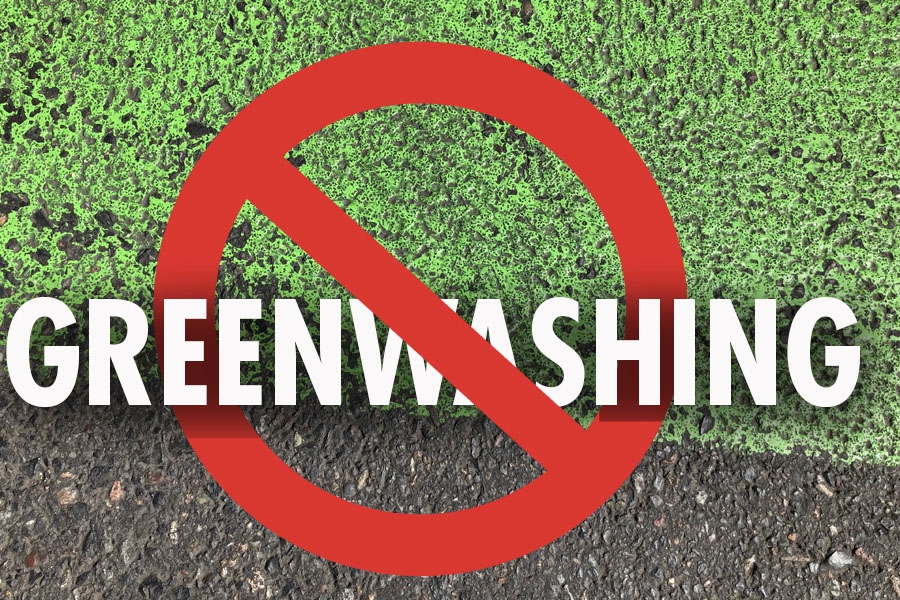In Oregon and elsewhere, benefit companies go largely unregulated.
A new Portland-based company will roll out stricter standards for benefit corporations this year to fill a gap in state reporting practices.
Currently, lax policing of benefit corporations opens loopholes for greenwashing. Of the 1,536 benefit companies—those that incorporate under a legal structure that allows them to pursue social and environmental good alongside profit—few post required annual progress reports. Even when they do, nobody checks whether they’re telling the truth.
Adding to the confusion, says Tom Hering, co-founder of certifier Benefit Corporations for Good, consumers and business owners often muddle two similar-sounding labels. Benefit corporations must pass muster with one of four third-party certifiers, including Benefit Corporations for Good and B-Labs. Yet only B-Labs offers the arduous audit that confers its nationally recognized B-Corp stamp.
“There’s a lot of confusion,” Hering says. “While their principles are the same, one’s a business certification and one’s a legal principle.”
B-Labs launched its certification in 2006. In 2010, realizing it needed a new legal structure for companies, not just a certification, the company developed model benefit company legislation and pushed legislators to adopt it. States began legalizing benefit corporations in 2011.
The organizational structure seeks to correct a longstanding assumption in corporate law—that a company must focus 100% of its energy on profit. Benefit corporations can tack on a social mission, while steering clear of shareholder lawsuits.
The names sound similar to consumers and business owners, but benefit corporation status lacks the rigor of the B-Corporation label. B-Labs developed both designations, but each serve different purposes and have vastly different standards.
While there are 1,536 benefit corporations, there are only 121 B-Corps, according to the B-labs website. Big name Oregon B-Corps include New Seasons, Stumptown Coffee Roasters and Sustainable Restaurant Group, Bamboo Sushi’s parent company.
Claire Randall, owner of Grand Central Bakery, spent around three years readying her company for the B-Corp certification it achieved in June. She paid $10,000, and audited not only the practices of the company and its 370 employees, but also every one of her suppliers, local farmers.

“We could hardly find the time to focus on the B-Corp certification,” Randall says. “I could only imagine how hard it is for them. For some of our smaller vendors it’s a big ask.”
“Just because we’re certified doesn’t mean we’re there,” Randall says. “There’s so much work we have to do. They keep upping the ante every time you recertify.”
Randall describes the certification process as rewarding, yet arduous. It demands a year after year commitment to documenting sustainable practices. One of the requirements is reincorporating as a benefit corporation within two years.
“Just because we’re certified doesn’t mean we’re there,” Randall says. “There’s so much work we have to do. They keep upping the ante every time you recertify.”
Demographic shifts among consumers and the labor market have made benefit corporation status, offered in 34 states, almost a prerequisite for doing business. Benefit Corporations for Good launched in April and has already rubber stamped 13 companies.
The certifier’s co-founder Maryanne Harmer says the trend crosses generational boundaries. Millennials overwhelmingly say they’ll work at or patronize a cause-driven organization over a profit-centered one. Boomer business owners seek to give back later in life.
In an ideal world, every benefit company would undertake the B-labs process. Yet many small businesses with good intentions can’t afford it. Others are overworked and confused by the legal complexities.
David Cascadden owns Left Coast Raw, a plant-based shake company in Bend. He’s committed to sustainability, but his business is a far cry from Grand Central Bakery. He, a bookkeeper and an attorney are the only employees.
Cascadden sources all his ingredients from organic suppliers, even though increased demand has driven up the price. He recently replaced his bulk plastic tubs with post-consumer recycled craft paper. He’s planning to donate 1% of his annual growth to the Deschutes River Alliance and a clean oceans nonprofit.
Cascadden met Harmer this spring on a kayaking trip in Baja, Mexico. She walked him through the benefit certification steps. The camaraderie among similar companies, Cascadden says, and the success of movement leaders like Patagonia (a certified B-corp), motivated him to undertake the process. Back home, he completed an interview and questionnaire, and earned his benefit company status this summer.
“It offers a foundation of support,” he says. “You don’t feel like you’re out there alone.”
Cascadden says Benefit Corporations for Good and its simple process fit into his packed schedule. The screenings from Hering’s company or the two other certifiers, Green America and the Global Reporting Initiative, largely consist of a brief survey and fees of $70 to $200. Cascadden wasn’t aware that B-Corp offered a more stringent process.
“The certifications are nice, but if the value of those becomes diluted by misuse and mistrust then what’s the point of doing it?” Cascadden says. “There needs to be some kind of verification, some kind of work done by the people getting the certification.”
No one checked Cascadden’s responses on the questionnaire or requested supporting documents. Hering says an interview on top of the survey allows Benefit Corporations for Good to screen out some companies with phony responses. But that heart-to-heart is as far as it goes. Cascadden collects every sustainability statement from his manufacturers to provide to the public if needed. He plans to post an annual report on his website detailing his sustainable sourcing.
Amid government paperwork, taxes and other quotidian business tasks, Cascadden can’t spend too much time auditing, certifying and re-certifying, as the larger B-Corporations do. If he did, he wouldn’t have a business at all.
“With all the work I have to do with the Department of Agriculture, the City of Bend, and then finally getting back to making the best product I can and selling it, basic business stuff,” Cascadden says, “once you get through the certification thing you push it aside and get back to your core activity.”
The Oregon Secretary of State, the agency that registers benefit companies, opts for a laissez-faire approach to benefit reporting. It allows small businesses to avoid onerous regulations. The department lacks the resources for the due diligence it thinks consumers can handle on their own.
“I’m just not sure if it makes sense to have the state step in and be a regulator where it hasn’t been,” says director of the Secretary of State’s corporations division Peter Threlkel. “You wind up getting into a lot of nitpicking.”
Hering’s nascent nonprofit plans to undertake some of that regulation itself. Beginning this year, it will require its certified companies to post annual reports, and publish an online list of the companies that comply.
“We want to make that designation meaningful and truthful,” Hering says. “It can’t just be greenwashing, which we think is pretty pervasive right now.”
The primary goal of incorporating as an Oregon benefit company, Threlkel says, is protection against shareholder lawsuits. Yet the label undoubtedly carries marketing cachet, Hering, a former ad man, says.
It also attracts venture capital. Investors are feeling the pulse of consumers, and turning toward “impact investing.” Social responsibility programs can boost a public company’s stock price, or earn recognition for a startup.
“It does make a business an attractive buyout if they have that mission built into their legal structure.” Hering says.
“We want to make that designation meaningful and truthful,” Hering says. “It can’t just be greenwashing, which we think is pretty pervasive right now.”
Yet in Oregon and elsewhere, benefit corporations go largely unregulated. Nationally, reporting falls below 10%. Of the 34 states with the designation, only two—New Jersey and Vermont—require benefit reports to be filed and audited.
Oregon’s reporting requirements fall short of model legislation established by nonprofit B-labs. Companies can omit financial information like director compensation. More importantly, the state does not require annual benefit reports to be filed with the state or audited, as the model stipulates.
A cursory search of the Oregon Secretary of State’s database of registered benefit companies reveals that many fail to comply with state guidelines. While companies don’t need to file an annual report with the agency, they are required to post one online or in another public forum.
Few of the small and mid-size companies listed post reports. Others don’t even have websites. A DJ with an expired domain and a Linkedin page is a benefit corporation. So are an iPhone repair company and a digital marketing agency with websites, but no visible annual reports.
“Like most model legislative acts most states take them and adapt them for their own use,” Threlkel says. Accountability is the company’s problem, he says, not the state’s. A benefit company that flaunts the requirements will almost certainly lose a shareholder lawsuit.
“Maybe there’s some marketing or greenwashing if they’re not truly following the requirements,” Threlkel admits. But he adds, “the people who should be checking up on that are the shareholders and officers of the company,” not the state.
“We could hardly find the time to focus on the B-corp certification,” Randall says. “I could only imagine how hard it is for them. For some of our smaller vendors it’s a big ask.”
Hering says the state does view reporting as important; but because of the lack of resources, certifiers like Benefit Corporations for Good need to step in. “While it seems like a great thing the state should be doing,” he says, “we’re going to take it on our own.” He hopes other nonprofits or volunteers will follow his lead.
This balancing act, guarding against greenwashing while avoiding an undue burden on regulators and mission-driven companies, raises important questions. Who should shoulder the responsibility of checking up on benefit corporations, the state or the private sector? How thorough should that screening be?
“That’s the $54,000 question right now,” Hering says. “The state has not devoted any funding right now to go and do an audit. One of our goals is pushing legislators to do that.”
The question of the day is how to maximize opportunities for do-gooders in a transparent fashion, given the limited resources of the state and entrepreneurs. Currently, 1,536 Oregon benefit companies could be reaping rewards: legal protection, startup capital and marketing return. Meanwhile, we don’t know what they are doing, or not doing, to contribute to the environment or society. Some are surely legitimate, others far from it. But no one’s keeping score.
Though it’s backed by good intentions, the benefit corporation label remains opaque. Consumers, investors and small business owners can easily confuse the organizational structure with the far more rigorous B-Corp stamp.
Some of the businesses themselves—even those that loathe excessive government paperwork—want more rigor. They want their stamp to have teeth.
“The certifications are nice, but if the value of those becomes diluted by misuse and mistrust then what’s the point of doing it?” Cascadden says. “There needs to be some kind of verification, some kind of work done by the people getting the certification.”
To subscribe to Oregon Business, click here.








